I recently returned from Portugal where I spent time as part of an Erasmus staff mobility. I spent a week at the Polytechnic Institute of Viana do Castelo, and more specifically at the Tourism Department within the School of Management & Technology. Viana do Castelo is located in the north-west of Portugal, in a beautiful province called Minho, and sits along the mouth of the Lima River.
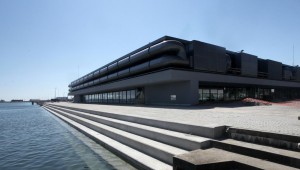
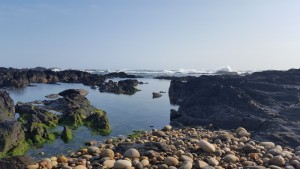
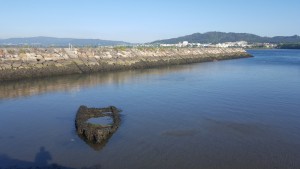
Having done my undergraduate studies in Portugal, and then my PhD in the UK, I have always reflected on the characteristics of the two educational systems. One major difference between them is that in Portugal the system assumes that the student has the skills and therefore the educational work mainly focuses on ‘doing’. In the UK, in contrast, we do not make such assumption and there is a very intense focus on study skills. In other words, we focus on content as much as on the process of doing the task well. That’s why we have very comprehensive study skills communities and we focus part of our learning and teaching activity on helping students to develop skills rather than knowledge.
Over the years I have learned about, and reflected on what those key skills are, while at the same time tried to find ways to explain these skills to students in a way that it makes sense to them. Initially, the driver to do this was the help myself (so that I could evolve my style of teaching and adapt to the UK system), but along the way I started to develop simple yet effective ways of explaining those skills to students.
Over the past two years I have put these ideas down on paper through my e-book on “Writing Dissertations & Theses: What you should know but no one tells you”. While the book explains, in a very student friendly way, some of the key skills required to do well in a dissertation, much of its content is also relevant to any academic assignment. After discussing with Portuguese colleagues what would be best for students, we concluded that focusing on developing these research skills would be interesting.
During my presentations I explained some of the key aspects of this work that I have been doing. In particular, I explained the 6Cs of Academic Writing Excellence that I explore in my e-book (Confined, Corroborated, Critical, Concise, Coherent and Captivating) as well as some of the tips & tools required to fulfill with these Cs. These tips & tools include the three pillars of research, the structure of an argument and the stages in the intellectual depth ladder. Personally, this was a great opportunity to share with Portuguese students the material I have been developing at Bournemouth. At the same time, it was an opportunity to test if the material and the explanation is suited to non-UK students.
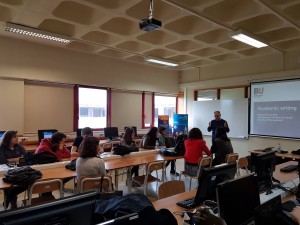
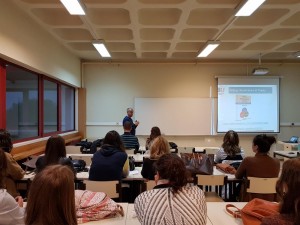
The feedback was tremendously positive with students using the presentation to reflect on their academic skills. There were very interesting discussions, with many questions asked and students showing a genuine interest in exploring this ‘New World’ for them. The impacts were immediate as after the first presentation on Monday, Dr. Alexandra told me that they were already applying some of the knowledge during their Tuesday session, where they worked on an assignment. One student commented on the school’s Facebook, saying “congratulations, it was a very interesting experience which has expanded our horizons and made us learn about other realities. Out of the box. An experience, without a doubt, to be repeated.”
During my visit I also worked with Dr. Alexandra Correia on a joint paper we started last year. I also met with Dr. Goretti Silva and Dr. Carlos Fernandes from the tourism department.
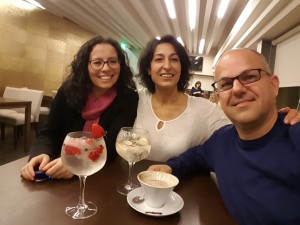
With Dr. Alexandra Correia and Dr. Goretti Silva at the Chocolate Factory Hotel, on the last day of the mobility.
 Erasmus+ Staff Mobility (Teaching) experience at the University of Beira Interior (UBI)
Erasmus+ Staff Mobility (Teaching) experience at the University of Beira Interior (UBI)










 Missing Persons Indicator Project Recruitment
Missing Persons Indicator Project Recruitment Celebrating our Research: Postgraduate Research Showcase 2026
Celebrating our Research: Postgraduate Research Showcase 2026 Nursing Research REF Impact in Nepal
Nursing Research REF Impact in Nepal Fourth INRC Symposium: From Clinical Applications to Neuro-Inspired Computation
Fourth INRC Symposium: From Clinical Applications to Neuro-Inspired Computation ESRC Festival of Social Science 2025 – Reflecting back and looking ahead to 2026
ESRC Festival of Social Science 2025 – Reflecting back and looking ahead to 2026 3C Event: Research Culture, Community & Cookies – Tuesday 13 January 10-11am
3C Event: Research Culture, Community & Cookies – Tuesday 13 January 10-11am ECR Funding Open Call: Research Culture & Community Grant – Application Deadline Friday 12 December
ECR Funding Open Call: Research Culture & Community Grant – Application Deadline Friday 12 December MSCA Postdoctoral Fellowships 2025 Call
MSCA Postdoctoral Fellowships 2025 Call ERC Advanced Grant 2025 Webinar
ERC Advanced Grant 2025 Webinar Horizon Europe Work Programme 2025 Published
Horizon Europe Work Programme 2025 Published Update on UKRO services
Update on UKRO services European research project exploring use of ‘virtual twins’ to better manage metabolic associated fatty liver disease
European research project exploring use of ‘virtual twins’ to better manage metabolic associated fatty liver disease